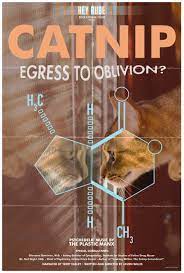
According to experts there are at least 250 species of catnip, not including the hybrids. What these species have in common is the active ingredient nepetalactone cycloalkane. This documentary takes you into the heart of the problem of addiction and the various effects that this substance has on cats. It includes expert opinions by Giovanni Dominice, M.D. (Giovanni Dominice), the acting director of Cytogenetics at the Institute for Studies of Feline Drug Abuse in Victor-Catania, New York and by Dr. Neil Knight Esq., (Neil Knight) Chief of Psychiatry at the Catnip Crisis Center in Sishigan, Michigan.
The documentary includes heartbreaking visuals of cats that are on the drug as well as testimonials of some felines and their experiences.
"Catnip: Egress to Oblivion?" was released in 2012 and was written and directed by Jason Willis. It is a comedy short in the format of a propaganda documentary and exploitation film. The budget is reported to have been $25, all of it spent on catnip. It is a hard hitting report that every cat owner should watch.
As the caretaker of two cats who are addicted to this narcotic I can attest to the effects it can have. One cat experiences excessive chewing, aggression, rubbing and rolling on the ground. The other cat spends his days in a listless stupor. On occasion they both are subject to frantic zoomies. We have tried everything we can think of to break them of their obsession but to no avail. Although the documentary is well done, there are no solutions given.
The film debuted, and won, at the Loft Cinema‘s First Friday Shorts competition. It was also entered into the American Film Institute’s AFI Film Fest. In 2013 the film won the Sundance Audience Award for Best Short Film.
The short was narrated by Terry Easley.
Catnip AKA Nepeta Cataria, is a member of the mint or Labiatae family. It is a perennial herb. The plant has various names such as catrup, catwort, cataria, or catmint. It is native to the area that spans from the eastern Mediterranean region to the eastern Himalayas. The herb has been naturalized over much of North America and can be found in many gardens throughout the United States. Although it was originally grown for humans as a cure for ails such as toothaches, colds and various stomach ailments (especially when taken as a tea) its effect on felines have made it a popular drug for both domestic and various wild cats, such as lions, bobcats and cougars.
Not all cats become addicted to catnip. Kittens usually do not develop a reaction to the substance until they are at least 6 to 8 weeks old. Addiction usually doesn’t start until they are at least 3 months old. By then it may be too late.

